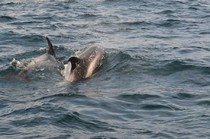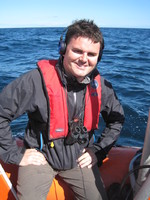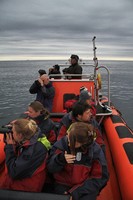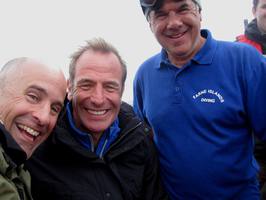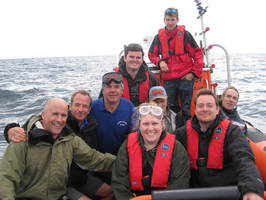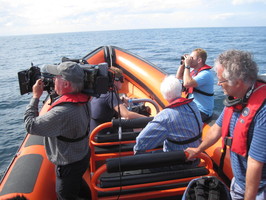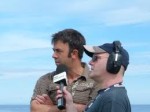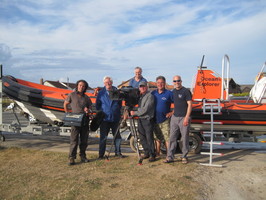PLEASE BE AWARE THAT THESE TRIPS INVOLVE TRAVEL OFFSHORE AND THAT SEA CONDITIONS CAN CHANGE AT SHORT NOTICE.
THE RIDE ON SOME TRIPS CAN BE RATHER "BUMPY" AND ANYONE WHO HAS BACK (SPINAL) PROBLEMS, NECK PROBLEMS OR WHO IS PREGNANT SHOULD AVOID THESE TRIPS. IF IN DOUBT PLEASE DISCUSS WITH WILLIAM SHIEL THE BOAT OPERATOR.
Entering the water to dive or swim with cetaceans off the UK coast is potentially an offence under various regulations including the Wildlife and Countryside Act 1981.
Dr Ben Burville has a special permit issued by the Marine Management Organisation to conduct this research.
As these trips involve research under licence from the Marine Management Organisation (http://www.marinemanagement.org.uk/) it may be useful for potential observers to have a brief outline of a typical trip.
The boat will load and observers welcomed on board - trips typically depart from Seahouses, Northumberland but may also depart from other local sites (e.g. Beadnell)
Weather conditions in the North Sea can change quite quickly so it is advisable to come with:
1. Plenty of warm clothes/wooly hat and a waterproof jacket.
2. Food & perhaps a flask/drink for a min. 4-5 hour period at sea.
3. As the RIB travels quickly to get access to sites offshore a pair of ski goggles can be very useful or sunglasses.
4. If you are prone to sea sickness please take tablets at least an hour before the trip.
After loading, as the boat leaves to head offshore, a short brief on white beaked dolphins is provided. During the trip detailed information on animals encountered is also provided. Throughout the trip if people have any questions on cetaceans or marine mammals Ben will try to answer these and Alan will field questions on any pelagic birds seen.
The aim is to locate white beaked dolphins although with a large expanse of sea this can be difficult and although the skipper has precise co-ordinates of areas where previous sightings have occurred this is nature and there are no guarantees.
During the travel offshore we will keep a sharp eye for sightings of birds and other cetaceans. If something is spotted the boat will stop to facilitate observation and photography if possible.
We will be looking for large numbers of gannets as these commonly mark sites rich with feed. (see video below)
If white beaked dolphins are encountered the boat will stop and the dolphins can then approach the stationary boat. They will at this point often approach very close to the boat. If conditions are suitable Ben will enter the water with High Definition filming equipment, as part of the research study.(N.B. Under the terms of a Wildlife Licence issued by the MMO).
Ben will usually stay close to the boat and the dolphins have a tendency to stay close to him – so views & photo opportunities can be very good. He is likely to be in the water for no more than 10 mins during such an encounter. He will then enter the boat and with great care the boat will set off at a slow steady rate on a linear track. This usually results in bow riding behaviour from the dolphin. White beaked dolphin are known to enjoy bow riding but will usually only engage in this for a short period 10-15 mins before “vanishing”.
(This is the reason why the research filming is done prior to the bow riding activity.)
The boat will then move on and resume the search process in another area.
With favourable conditions the above process is repeated.
On a typical trip, if the dolphins are located, Ben’s research filming will involve 1 or 2 x 10mins in the water and during this time there are often good photo opportunities from the boat. Please keep in mind that trips are typically 4-5 hours.
As the search process is under way the boat will often stop and drift providing plenty of opportunity for observers to stretch their legs and use the small toilet at the stern of the boat. During such stops we often find that fulmar will settle near to the RIB.
If we see very little in an area the advantage of the RIB is that we can rapidly move to another area and search.

